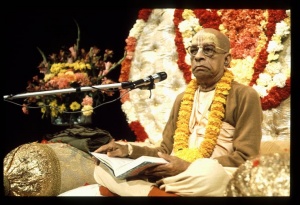SB 7.7.4-5: Difference between revisions
m (1 revision(s)) |
(Vanibot #0054 edit - transform synonyms into clickable links, which search similar occurrences) |
||
| (One intermediate revision by one other user not shown) | |||
| Line 1: | Line 1: | ||
{{info | {{info | ||
|speaker= | |speaker=Prahlāda Mahārāja | ||
|listener= | |listener=Prahlāda Mahārāja's school friends | ||
}} | }} | ||
[[Category:Srimad-Bhagavatam - Canto 07 Chapter 07|s04-05 ]] | |||
[[Category:Bhagavatam Verses Spoken by Prahlada Maharaja - Vanisource|070704]] | |||
<div style="float:left">'''[[Srimad-Bhagavatam]] - [[SB 7|Seventh Canto]] - [[SB 7.7: What Prahlada Learned in the Womb|Chapter 7: What Prahlāda Learned in the Womb]]'''</div> | |||
<div style="float:right">[[File:Go-previous.png|link=SB 7.7.3]] '''[[SB 7.7.3]] - [[SB 7.7.6]]''' [[File:Go-next.png|link=SB 7.7.6]]</div> | |||
{{RandomImage}} | |||
==== TEXTS 4-5 ==== | ==== TEXTS 4-5 ==== | ||
<div | <div class="verse"> | ||
teṣām atibalodyogaṁ | :teṣām atibalodyogaṁ | ||
niśamyāsura-yūthapāḥ | :niśamyāsura-yūthapāḥ | ||
vadhyamānāḥ surair bhītā | :vadhyamānāḥ surair bhītā | ||
dudruvuḥ sarvato diśam | :dudruvuḥ sarvato diśam | ||
kalatra-putra-vittāptān | |||
gṛhān paśu-paricchadān | :kalatra-putra-vittāptān | ||
nāvekṣyamāṇās tvaritāḥ | :gṛhān paśu-paricchadān | ||
sarve prāṇa-parīpsavaḥ | :nāvekṣyamāṇās tvaritāḥ | ||
:sarve prāṇa-parīpsavaḥ | |||
</div> | </div> | ||
| Line 21: | Line 27: | ||
==== SYNONYMS ==== | ==== SYNONYMS ==== | ||
<div | <div class="synonyms"> | ||
''[//vanipedia.org/wiki/Special:VaniSearch?s=teṣām&tab=syno_o&ds=1 teṣām]'' — of the demigods, headed by King Indra; ''[//vanipedia.org/wiki/Special:VaniSearch?s=atibala&tab=syno_o&ds=1 atibala]-[//vanipedia.org/wiki/Special:VaniSearch?s=udyogam&tab=syno_o&ds=1 udyogam]'' — the great exertion and strength; ''[//vanipedia.org/wiki/Special:VaniSearch?s=niśamya&tab=syno_o&ds=1 niśamya]'' — hearing of; ''[//vanipedia.org/wiki/Special:VaniSearch?s=asura&tab=syno_o&ds=1 asura]-[//vanipedia.org/wiki/Special:VaniSearch?s=yūthapāḥ&tab=syno_o&ds=1 yūthapāḥ]'' — the great leaders of the demons; ''[//vanipedia.org/wiki/Special:VaniSearch?s=vadhyamānāḥ&tab=syno_o&ds=1 vadhyamānāḥ]'' — being killed one after another; ''[//vanipedia.org/wiki/Special:VaniSearch?s=suraiḥ&tab=syno_o&ds=1 suraiḥ]'' — by the demigods; ''[//vanipedia.org/wiki/Special:VaniSearch?s=bhītāḥ&tab=syno_o&ds=1 bhītāḥ]'' — afraid; ''[//vanipedia.org/wiki/Special:VaniSearch?s=dudruvuḥ&tab=syno_o&ds=1 dudruvuḥ]'' — ran away; ''[//vanipedia.org/wiki/Special:VaniSearch?s=sarvataḥ&tab=syno_o&ds=1 sarvataḥ]'' — in all; ''[//vanipedia.org/wiki/Special:VaniSearch?s=diśam&tab=syno_o&ds=1 diśam]'' — directions; ''[//vanipedia.org/wiki/Special:VaniSearch?s=kalatra&tab=syno_o&ds=1 kalatra]'' — wives; ''[//vanipedia.org/wiki/Special:VaniSearch?s=putra&tab=syno_o&ds=1 putra]-[//vanipedia.org/wiki/Special:VaniSearch?s=vitta&tab=syno_o&ds=1 vitta]'' — children and wealth; ''[//vanipedia.org/wiki/Special:VaniSearch?s=āptān&tab=syno_o&ds=1 āptān]'' — relatives; ''[//vanipedia.org/wiki/Special:VaniSearch?s=gṛhān&tab=syno_o&ds=1 gṛhān]'' — homes; ''[//vanipedia.org/wiki/Special:VaniSearch?s=paśu&tab=syno_o&ds=1 paśu]-[//vanipedia.org/wiki/Special:VaniSearch?s=paricchadān&tab=syno_o&ds=1 paricchadān]'' — animals and paraphernalia of household life; ''[//vanipedia.org/wiki/Special:VaniSearch?s=na&tab=syno_o&ds=1 na]'' — not; ''[//vanipedia.org/wiki/Special:VaniSearch?s=avekṣyamāṇāḥ&tab=syno_o&ds=1 avekṣyamāṇāḥ]'' — seeing to; ''[//vanipedia.org/wiki/Special:VaniSearch?s=tvaritāḥ&tab=syno_o&ds=1 tvaritāḥ]'' — very hasty; ''[//vanipedia.org/wiki/Special:VaniSearch?s=sarve&tab=syno_o&ds=1 sarve]'' — all of them; ''[//vanipedia.org/wiki/Special:VaniSearch?s=prāṇa&tab=syno_o&ds=1 prāṇa]-[//vanipedia.org/wiki/Special:VaniSearch?s=parīpsavaḥ&tab=syno_o&ds=1 parīpsavaḥ]'' — very much desiring to live. | |||
</div> | </div> | ||
| Line 28: | Line 34: | ||
==== TRANSLATION ==== | ==== TRANSLATION ==== | ||
<div | <div class="translation"> | ||
When the great leaders of the demons, who were being killed one after another, saw the unprecedented exertion of the demigods in fighting, they began to flee, scattering themselves in all directions. Simply to protect their lives, they hastily fled from their homes, wives, children, animals and household paraphernalia. Paying no heed to all these, the demons simply fled. | When the great leaders of the demons, who were being killed one after another, saw the unprecedented exertion of the demigods in fighting, they began to flee, scattering themselves in all directions. Simply to protect their lives, they hastily fled from their homes, wives, children, animals and household paraphernalia. Paying no heed to all these, the demons simply fled. | ||
</div> | </div> | ||
__NOTOC__ | |||
<div style="float:right; clear:both;">[[File:Go-previous.png|link=SB 7.7.3]] '''[[SB 7.7.3]] - [[SB 7.7.6]]''' [[File:Go-next.png|link=SB 7.7.6]]</div> | |||
__NOTOC__ | |||
__NOEDITSECTION__ | |||
Latest revision as of 23:06, 18 February 2024

A.C. Bhaktivedanta Swami Prabhupada
TEXTS 4-5
- teṣām atibalodyogaṁ
- niśamyāsura-yūthapāḥ
- vadhyamānāḥ surair bhītā
- dudruvuḥ sarvato diśam
- kalatra-putra-vittāptān
- gṛhān paśu-paricchadān
- nāvekṣyamāṇās tvaritāḥ
- sarve prāṇa-parīpsavaḥ
SYNONYMS
teṣām — of the demigods, headed by King Indra; atibala-udyogam — the great exertion and strength; niśamya — hearing of; asura-yūthapāḥ — the great leaders of the demons; vadhyamānāḥ — being killed one after another; suraiḥ — by the demigods; bhītāḥ — afraid; dudruvuḥ — ran away; sarvataḥ — in all; diśam — directions; kalatra — wives; putra-vitta — children and wealth; āptān — relatives; gṛhān — homes; paśu-paricchadān — animals and paraphernalia of household life; na — not; avekṣyamāṇāḥ — seeing to; tvaritāḥ — very hasty; sarve — all of them; prāṇa-parīpsavaḥ — very much desiring to live.
TRANSLATION
When the great leaders of the demons, who were being killed one after another, saw the unprecedented exertion of the demigods in fighting, they began to flee, scattering themselves in all directions. Simply to protect their lives, they hastily fled from their homes, wives, children, animals and household paraphernalia. Paying no heed to all these, the demons simply fled.